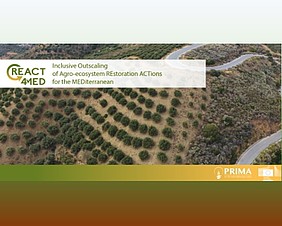Every year, the Mediterranean land loses about 0.5 tons of fertile soil per hectare due to soil erosion, which is almost double than the European average. At the same time, the water resources of the Mediterranean basin are under constant pressure, due to intense weather events but mainly due to anthropogenic causes, such as climate change, urbanization, population growth and resource overexploitation. This pressure, which inevitably leads the Mediterranean countries to a downward spiral of land degradation and desertification, is one of the single greatest risks to the conservation of local ecosystems and the livelihoods of the Mediterranean communities.
To address these risks, deeper scientific knowledge and better environmental monitoring are needed, so that scientists and decision makers can improve environmental assessments and propose effective sustainable land and water management measures. These measures may include well-established or innovative actions such as afforestation of marginal lands, mulching to prevent erosion and conservation of soil moisture, differentiated cultivation systems, integrated or biological management of soil fertility, use of alternative water resources, and smart farming. Nevertheless, the mere implementation of promising measures is often not enough to produce tangible results and to make sense as a public or private investment opportunity. Social acceptance and harmonization with the social and economic development of the Mediterranean, especially of the more vulnerable social groups, with fair participation in the benefits, are prerequisites for the widespread adoption and success of such restoration actions.
In this context, the PRIMA REACT4MED Project, entitled "Inclusive Outscaling of Agro-ecosystem Restoration ACTions of the Mediterranean", brings together an interdisciplinary team of researchers and professionals working to enhance Sustainable Land and Water Management to improve the livelihoods of Mediterranean communities. The REACT4MED Project, funded by the PRIMA Programme, consists of 11 partners (Universities, research institutes, and an SME) from countries cooperating with PRIMA (Greece, Italy, Germany, Cyprus, Israel, Spain, Morocco, Turkey, and Egypt).
The PRIMA Programme (Partnership for Research and Innovation in the Mediterranean Area) is a European Union Programme supported by Horizon 2020, focused on building research and innovation capacities, and devising innovative solutions addressing critical problems in the fields of water management and agro-alimentary systems in the Mediterranean.
The PRIMA REACT4MED Project is coordinated by the Hellenic Mediterranean University and the Technical University of Crete participates in the REACT4MED as Work Package Leader for studying the historical evolution and future storylines of climate and human activities in relation to ecosystem changes in the Mediterranean, led by Dr. Aristeidis Koutroulis, Associate Professor at the School of Chemical and Environmental Engineering. During REACT4MED, which is scheduled to end in 2025, project partners will work systematically for the widespread implementation of measures to enhance sustainable land and water management, support increased agropastoral productivity, and accelerate and disseminate relevant technological innovation.
The partners of PRIMA REACT4MED will hold the Project’s Kickoff meeting between 20 and 23 June in Heraklion, Crete, Greece, with the participation of stakeholders from the local government and the local community. For more information about the Project, please contact the REACT4MED project ( info<at>react4med.eu. )


